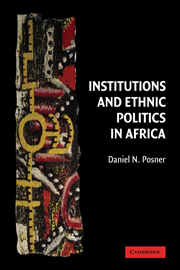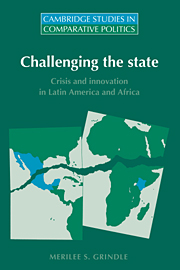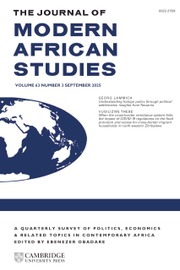Institutions and Ethnic Politics in Africa
Presenting a theory to explain how politics revolves around one axis of social cleavage instead of another, Daniel Posner examines Zambia, where people identify themselves either as members of one of the country's seventy-three tribes or as members of one of its four principal language groups. Drawing on a simple model of identity choice, Posner demonstrates that the answer depends on whether the country is operating under single-party or multi-party rule, thus revealing how formal institutional rules determine the social cleavages that matter.
- Shifts the emphasis from explaining why politicians 'play the ethnic card' to explaining why they play a particular ethnic card
- Provides a careful analysis of the politics of ethnicity in Africa
- Provides an example of innovative research design and the integration of qualitative and quantitative methods
Reviews & endorsements
"Institutions and Ethnic Politics in Africa, as the title indicates, is far more than a detailed case study of Zambia, a former British colony known as Northern Rhodesia before independence. It is also a splendid primer as to how to systematically apply institutional analysis to explain political behavior."
-Sheldon Gellar, Indiana University, Perspectives on Politics
"This is a superb analysis of the structure of political cleavages in Africa. It puts forth a parsimonious model that highlights the role of group size and spells out and tests its empirical implications. Institutions and Ethnic Politics in Africa should make a major impact in political science and sociology."
-Michael Hechter, University of Washington
"Posner's book is a major contribution to a positive theory of political cleavages. It is commonplace to demonstrate that political entrepreneurs in third-world democracies have an incentive to play the ethnic card. But the problem is that voters have a royal flush of ethnic identities, any of which can be played upon by politicians. Posner offers a stimulating account of the demographic and institutional conditions that lead politicians and voters to play the particular ethnic cards that they do, and thereby to set the political agenda. Rich empirical data turn a plausible theoretical account into a fully cogent perspective on the foundation of political cleavages."
-David D. Laitin, Stanford University
"Daniel Posner here offers a powerful new theory of ethnic politics that combines institutionalist and rationalist approaches to social science with a social constructivist approach to ethnic identity. Drawing on an analytical model of ethnic identities and coalitions, Posner shows how institutions shape ethnic identities. Over decades, institutions narrow a wide range of potential ethnic identities to a set of politically salient identities. In the short run, institutions determine which of those salient identities are the basis of mobilization and voting. Drawing on a natural experiment in Zambia where electoral rules changed from multi-party political competition to one-party rule and back again, Posner demonstrates the power of this theory. The result is a sophisticated work that combines field research, institutionalist and constructivist theory, and data analysis -- in short, a must read for scholars of ethnic politics and comparative social science."
-Elisabeth Jean Wood, Yale University
"This book is a compelling and path-breaking account of the politics of ethnic identity. Drawing on an analysis of ethnic politics in Zambia, Posner develops an original theoretical argument that addresses fundamental questions of ethnic politics in any multi-cultural society. Why do some ethnic identities become politically relevant, while others recede as less salient, despite their equal importance in earlier periods? How do voters choose among the various salient ethnic identities as a basis for political action? This book is an important contribution to political science, sociology, and African studies."
-M. Crawford Young, University of Wisconsin, Madison
"Posner makes a persuasive argument for the relevance of his conclusions first in Africa (and especially in the case of Kenya) and then in other parts of the world. Yet I predict that the broader significance of this book is likely to be less its specific theoretical conclusions and more the highly original kinds of questions that Posner applies to political behavior and ideas and his rigorous creative methodological approaches to those questions."
-Charles Ambler, University of Texas at El Paso, African Studies Review
Product details
No date availableAdobe eBook Reader
9781316038420
0 pages
0kg
36 b/w illus. 17 tables
This ISBN is for an eBook version which is distributed on our behalf by a third party.
Table of Contents
- 1. Introduction: institutions and ethnic politics
- Part I. Accounting for the Ethnic Cleavage Structure:
- 2. Accounting for Zambia's ethnic cleavage structure I: the emergence of tribal identities in colonial Northern Rhodesia
- 3. Accounting for Zambia's ethnic cleavage structure II: the emergence of language identities in colonial Northern Rhodesia
- Part II. Accounting for Ethnic Coalition-Building Choices:
- 4. Ethnicity and ethnic politics in post-independence Zambia
- 5. Explaining changing patterns of ethnic politics
- Part III. Testing the Model:
- 6. Competing explanations
- 7. Ethnic campaigning: testing the observable implications of the model for elite behavior
- 8. Ethnic voting: testing the observable implications of the model for mass behavior
- Part IV. Beyond Zambia:
- 9. Regime change and ethnic politics in Africa
- 10. Beyond regime change, beyond Africa
- Appendix A. Native authorities and tribal identifications
- Appendix B. Survey and focus group methodologies
- Appendix C. Tribal affiliations of parliamentary candidates
- Appendix D. Tribal demographies of electoral constituencies.






